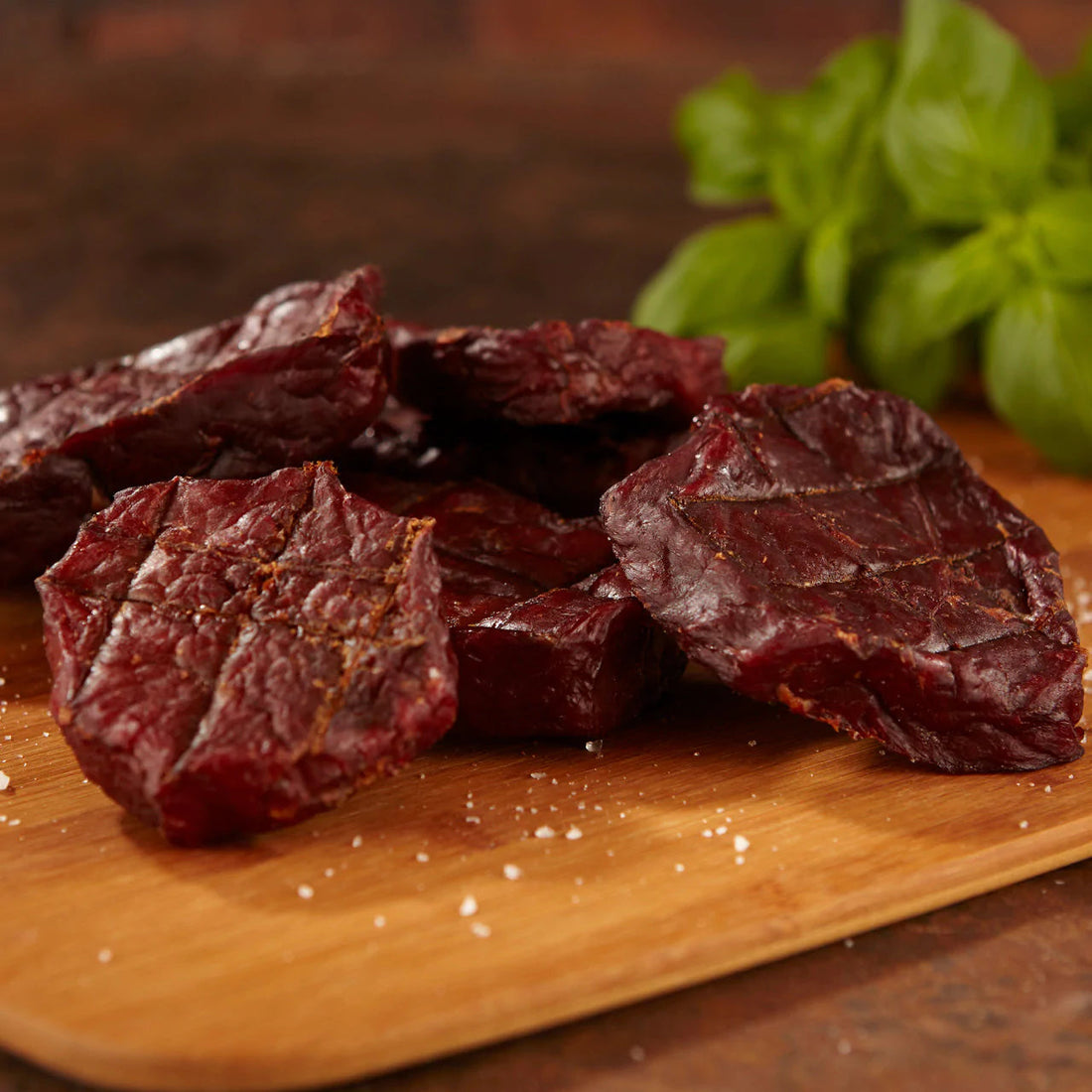
Can Beef Jerky Spoil? Essential Tips for Freshness
Chad MathewsShare
Does Beef Jerky Spoil?
Beef jerky, while a beloved snack, does have a shelf life, especially after opening. Factors such as exposure to air, moisture, and heat can accelerate spoilage. Typically, unopened jerky can last for months, but once the package is opened, it’s best consumed within a few days for optimal flavor and safety. Proper storage is key to prolonging its freshness.
If beef jerky is left in warm conditions or exposed to sunlight, it can spoil more quickly. Signs of spoilage include:
- an off smell
- mold growth
- changes in texture
Consuming spoiled jerky can lead to food poisoning, so it's crucial to be vigilant. By understanding these factors, you can enjoy your jerky without worry.
Signs of Spoiled Jerky
When assessing the freshness of beef jerky, several signs indicate spoilage. A noticeable off-putting smell is often the first warning sign. If the jerky emits a rancid or sour odor, it’s best to discard it immediately to avoid potential foodborne illness.
Another critical indicator of spoiled jerky is the presence of mold. If you spot any fuzzy growths on the surface, this is a clear sign that moisture has compromised the product. Additionally, condensation inside the packaging suggests that the jerky has absorbed excess moisture, making it unsafe to consume.
Texture changes can also signal that your jerky has gone bad. Fresh jerky should be chewy and flexible; if it becomes excessively hard or brittle, it may have deteriorated. This change in texture can affect both the taste and safety of the product, warranting caution before consumption.
Lastly, always consider the storage conditions of your jerky. If it has been exposed to heat, humidity, or direct sunlight, the risk of spoilage increases significantly. Keeping jerky in a cool, dry place is essential for maintaining its quality and safety, ensuring you can enjoy it without worry.
Storage Tips for Freshness
To maintain the freshness of beef jerky, proper storage is essential. Once opened, it’s best to consume the jerky within three days for optimal flavor and quality. However, if stored correctly in a cool, dry place, it can last up to 30 to 60 days. Avoid exposure to moisture, oxygen, and direct sunlight to prolong its shelf life.
Temperature plays a significant role in jerky preservation. High heat can accelerate spoilage, especially if the package is opened. If you find yourself in a hot environment, consider refrigerating or freezing the jerky to maintain its quality. Even unopened jerky can suffer in extreme heat, so always store it in a temperature-controlled area when possible.
Recognizing signs of spoilage is crucial for safety. Look for changes in smell, texture, or the presence of mold. If the jerky smells off or has condensation in the packaging, it’s best to discard it. By following these storage tips, you can enjoy your beef jerky longer while ensuring it remains safe and delicious.
How Long Does Jerky Last?
Beef jerky is a beloved snack, but it doesn't last indefinitely. After opening, it typically remains good for 30 to 60 days if stored properly. Factors like exposure to moisture, oxygen, and heat can accelerate spoilage. To enjoy the best flavor and quality, it's advisable to consume it within three days of opening, although it may still be safe beyond that timeframe.
If jerky is left in warm conditions, such as a hot car, its shelf life diminishes significantly, especially if already opened. Signs of spoilage include:
- an off smell
- mold growth
- changes in texture
Consuming spoiled jerky can lead to food poisoning, making it crucial to recognize these indicators and store your jerky correctly to maximize its longevity and safety.
Effects of Heat on Jerky
Heat can significantly impact the quality and safety of beef jerky. When exposed to high temperatures, especially in environments like hot cars or direct sunlight, jerky can spoil more quickly, even if it’s unopened. Signs of spoilage include off-putting smells, mold growth, and changes in texture. To ensure a safe snacking experience, it's crucial to store jerky properly and consume it within recommended timeframes.What Happens If You Eat Bad Jerky?
Eating bad jerky can lead to unpleasant consequences, primarily food poisoning. When beef jerky spoils, harmful bacteria can proliferate, resulting in symptoms such as nausea, vomiting, diarrhea, and abdominal pain. Signs of spoiled jerky include an off-putting smell, visible mold, or a change in texture, indicating that it’s best to avoid consumption to protect your health.
To minimize the risk of eating bad jerky, proper storage is essential. Keeping jerky in a cool, dry place and consuming it within a few days of opening can help maintain its quality. If you notice any signs of spoilage, it’s crucial to discard the jerky immediately. Prioritizing freshness and quality when purchasing jerky can significantly reduce the chances of encountering spoiled products.
Preserving Jerky for Longevity
To preserve jerky for longevity, it’s essential to understand the factors that contribute to its shelf life. Once opened, beef jerky can remain good for 30 to 60 days if stored properly. Keeping it sealed and in a dry environment minimizes exposure to oxygen, moisture, and sunlight, which are the primary culprits that can spoil this tasty snack.
When traveling or camping, be mindful of temperature fluctuations. While unopened jerky can withstand some heat, exposure to high temperatures can accelerate spoilage once the package is opened. If jerky has been left in a hot car or direct sunlight, it’s best to check for signs of spoilage, such as an off smell or changes in texture, before consuming it.
For those with an abundance of jerky, freezing is an excellent option to extend its life up to six months. Proper storage in freezer bags helps maintain the jerky's quality, allowing you to enjoy it at your convenience. By prioritizing quality jerky and following these preservation tips, you can savor your favorite snack without the worry of it going bad.
